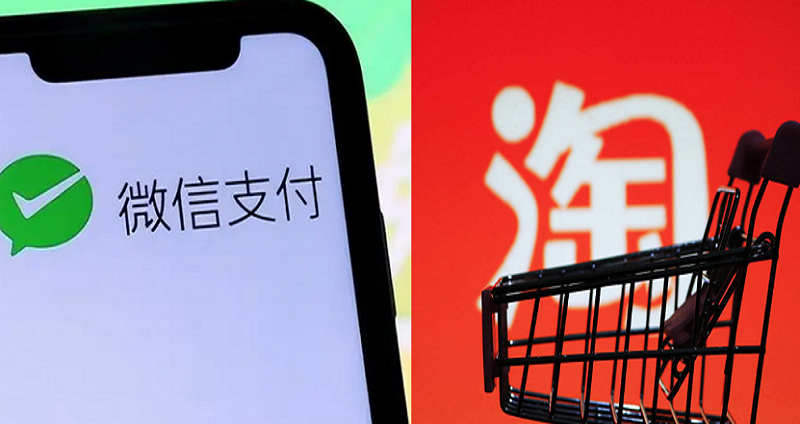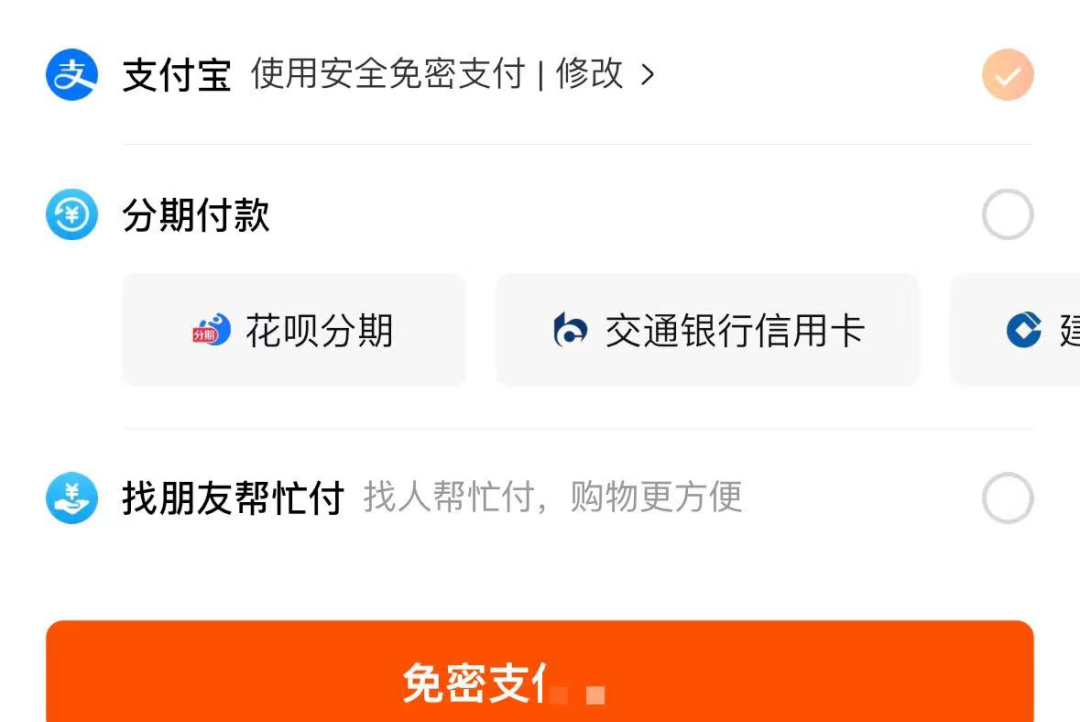Taobao and WeChat Pay break down walls, internet giants shift from 'traffic is king' to 'user first'
![]() 09/09 2024
09/09 2024
![]() 462
462

Recently, two major internet giants have witnessed a landmark "wall-breaking" event in the internet industry.
On September 4th, Taobao Tmall officially announced that it will fully integrate WeChat Pay by the end of this month, and WeChat Pay is expected to be gradually available to all Taobao Tmall merchants after September 12th. This means that the long-awaited full integration of Taobao Tmall with WeChat Pay is about to be officially implemented.
In response to the cooperation between the two parties, Taobao Tmall Group stated that it has always upheld the concept of open cooperation, actively explored interoperability with various platforms, and continuously improved the shopping experience for consumers, making it more convenient, enjoyable, and efficient. WeChat Pay also responded that it has always adhered to the concept of open cooperation and actively explored interoperability with various fields.
Upon inquiry, the payment interface of the Taobao mobile app currently does not yet show the WeChat Pay option, and it is still under trial and not fully open yet.

Screenshot of Taobao mobile payment interface
Some users who have been tested in the gray-scale version indicated that they have grown accustomed to using Alipay for shopping on Taobao, and having multiple payment options through WeChat Pay does not seem significant. Furthermore, when using WeChat Pay for shopping on Taobao, users still need to jump to WeChat Pay first before returning to the Taobao app. In contrast, paying directly with Alipay is much more straightforward, as it can be completed within the Taobao app without having to switch apps.
The intention behind Taobao's integration with WeChat Pay is obvious to all: to further expand its user base, especially in the lower-tier markets. According to insiders at Taobao, data from the pilot period has already shown significant results in attracting users from lower-tier cities.
Undoubtedly, this adjustment is widely regarded by the industry as a landmark progress in the "wall-breaking" efforts between internet giants.
01
11 Years of Love-Hate Relationship
From Building Walls to Breaking Them Down
The integration of Taobao and WeChat Pay marks the end of an 11-year-long mutual blockade between the two platforms.
Flashback to November 2013, Taobao closed its redirect channel to WeChat on the grounds of protecting user security. All access requests from WeChat would automatically redirect to the download page of the Taobao mobile app. At that time, WeChat had only 300 million users. When users clicked on a Taobao link within WeChat, they would be redirected to the download page of the Taobao mobile app instead of the product shopping interface.
After being "banned" by Taobao, Tencent quickly erected barriers, directly blocking the sharing and downloading of Taobao external links on WeChat. From then on, users could no longer redirect to Taobao in any form within WeChat.
It wasn't until 2015 that Taobao introduced "Taobao Passwords," allowing users to indirectly share product content on WeChat by copying passwords. Even so, opening Taobao on WeChat still required jumping over the WeChat wall.
During the period when the two platforms were building walls, China's mobile internet was in its golden age of rapid development. Both Alibaba and Tencent were aggressively expanding their businesses into various fields, trying to keep users within their own ecosystems.
As the battle intensified, the conflict between Taobao and WeChat extended to the competition between Tencent and Alibaba.
In February 2014, Alipay closed its payment interface for WeChat merchants. In 2015, after Alipay launched its red envelope function, it was immediately blocked by Tencent and could not be shared on WeChat or QQ.
It wasn't until China's anti-monopoly governance of the internet in 2021 that the relationship between the two began to subtly ease.
In April 2021, the Ministry of Industry and Information Technology specifically required internet companies to rectify issues such as blocking website links and achieve "interoperability," with a deadline of five months for rectification. According to the requirements of the Ministry, all internet platforms must remove blocks by September 17th of that year. Under heavy pressure, multiple internet giants faced hefty penalties, including Alibaba and Tencent, as well as giants like Suning and Meituan.
Driven by policy, in September 2021, WeChat announced that it would implement new external link management measures in stages and steps. Two months later, some external links within the WeChat ecosystem regained access. At that time, users could directly access external links in private chat windows, and the access function for e-commerce external links in group chat scenarios was also trialed and opened.
Concurrently, multiple Alibaba-affiliated apps, including Ele.me, Youku, and Damai, successively integrated WeChat Pay. Additionally, Taobao Deals, Xianyu, and Hema also announced their applications for integration with WeChat Pay and were awaiting approval.
Over the following three years, WeChat restored access to Taobao external links in one-on-one conversation scenarios, gradually extending it to group chat scenarios. In September 2023, Alimama and Tencent Advertising announced a deep strategic partnership, with high-quality advertising traffic from WeChat Video Accounts, Moments, and Mini Programs being opened up to Taobao merchants through Alimama UD performance advertising. Taobao's presence could be seen everywhere in advertising placements on WeChat Video Accounts, Moments, and Mini Programs, and clicking on them would direct users to merchant stores, product details pages, and Taobao live streaming rooms.
As the mobile internet's red ocean era wanes and growth reaches a ceiling, internet companies have entered a new stage where they must huddle together for warmth.
As early as last year's Singles' Day, WeChat Pay had already quietly appeared on the Taobao payment interface. Users needed to save the payment QR code and jump to WeChat to complete the payment. However, its lengthy payment process of saving a screenshot, opening WeChat, and scanning the QR code was still criticized.
Nonetheless, Taobao officials offered an optimistic explanation, stating that the feature was still in the gradual opening phase, and its availability would be based on real-time display on the payment page.
In February of this year, some users discovered that when using WeChat Pay on Taobao, they could directly jump to WeChat Pay to complete the transaction, sparking heated discussions on social media and becoming another milestone in the history of internet development. In the same month, Xianyu successfully launched on the WeChat Mini Program, allowing WeChat users to directly use the Xianyu app within the Mini Program and complete transaction loops through WeChat Pay, significantly enhancing the user experience and further advancing interoperability between the two platforms.
In August of this year, Taobao Deals led the way in introducing WeChat Pay into its payment system, allowing users to directly use WeChat Pay within the Taobao Deals app without having to jump out of the platform.
At the end of August 2024, the State Administration for Market Regulation issued a statement stating that Alibaba had fully ceased its "either-or" monopolistic practices as required, and that "compliance rectification efforts have achieved good results.""From mutual blockades to mutual interoperability, as the mobile internet industry enters an era of stock competition, growth slows down significantly for industry giants like Alibaba and Tencent. By achieving interoperability, they can further complement each other's shortcomings and gain new increments.
02
After Interoperability
Who Benefits More?
In this cooperation, Taobao is more proactive. In fact, Taobao has been actively seeking cooperation with WeChat over the past few years.
Over the past few years, Pinduoduo, which relies on Tencent's traffic pool, has posed a certain challenge to Taobao-series e-commerce platforms. In 2023, Taobao Tmall included "price competitiveness" as one of its five strategies, attempting to compete with Pinduoduo through similarly low prices, but the results were not ideal.
According to a Goldman Sachs report, Taobao Tmall's market share declined from 66% in 2019 to around 44% in 2022, a drop of about one-third over four years. Integrating WeChat Pay is a crucial step for Taobao to break through in the existing market.
According to Alibaba's latest financial report, Taobao Tmall Group's revenue in the second quarter of 2024 was 113.337 billion yuan, a year-on-year decrease of 1%. Adjusted EBITA also decreased by 1% year-on-year to 48.81 billion yuan.
According to Tencent's latest financial report, as of June 30, 2024, the combined monthly active user accounts of WeChat and WeChat International reached 1.371 billion, while Alipay's average monthly active users were 893 million. In the lower-tier markets, WeChat Pay, as a "national-level application," has firmly established itself as the top choice.
For Taobao, the most obvious benefit of integrating WeChat Pay is access to more potential consumer groups. Especially for Taobao Tmall Group, which is experiencing slower growth, enhancing the user experience has become the top priority.
In his first letter to all employees after taking office in September last year, Alibaba CEO Wu Yongming wrote that Alibaba must be more resolute in shifting its perspective to users. To create the best user experience, it must seek the broadest range of openness and cooperation, including companies that were traditionally seen as competitors.
For WeChat Pay, the cooperation may boost Tencent's financial technology business. According to financial reports, in the second quarter of this year, Tencent's financial technology and enterprise services revenue increased slightly by 4% year-on-year to 50.4 billion yuan, accounting for a 1% decrease in total revenue. The financial report noted that the growth rate of financial technology service revenue slowed down to single digits, reflecting slow growth in consumer spending. Meanwhile, the revenue from consumer lending services declined due to enhanced risk management measures.
After bidding farewell to the period of rapid development, the internet's "wall-breaking" initiative has become a general trend.
In December 2021, Kuaishou and Meituan announced a strategic cooperation on interoperability.
In January 2022, Baidu joined forces with over ten companies, including Meituan, Xiaohongshu, SF Express, Ctrip, Zhihu, Tongcheng, Maoyan, and 58.com, to announce a deep strategic cooperation on interoperability, covering traffic, technology, and service ecosystems.
In December 2023, Xiaohongshu announced the establishment of the "Grass-Seeding Data Alliance," which will integrate Xiaohongshu's grass-seeding data with transaction data from other platforms through open data cooperation.
However, achieving interoperability between platforms is a complex matter involving data sharing issues. Jiao Haitao, a professor at the Civil and Commercial Law School of China University of Political Science and Law, once mentioned that "interoperability may still need to have boundaries. It certainly does not mean complete openness or data sharing, as some radical views suggest. Instead, reasonable boundaries need to be set.""Finding reasonable boundaries requires continuous trial and error between platforms. Undoubtedly, in the era of "user first," we will witness a new battle among giants.








